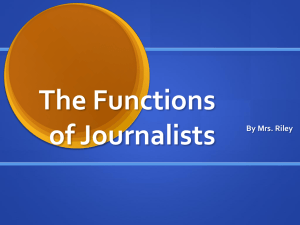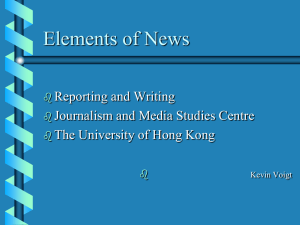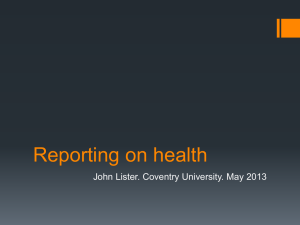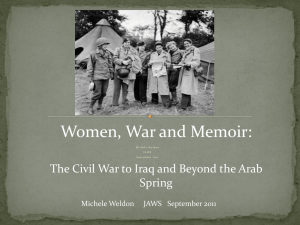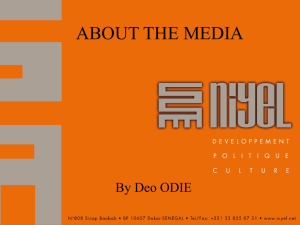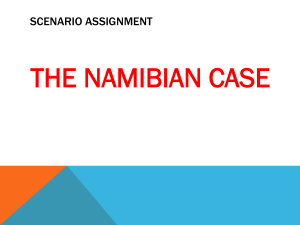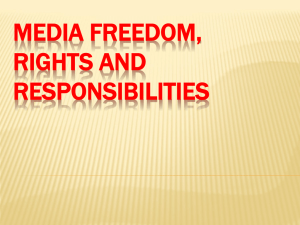opening statement, Frank La Rue, SR on freedom of expression
advertisement
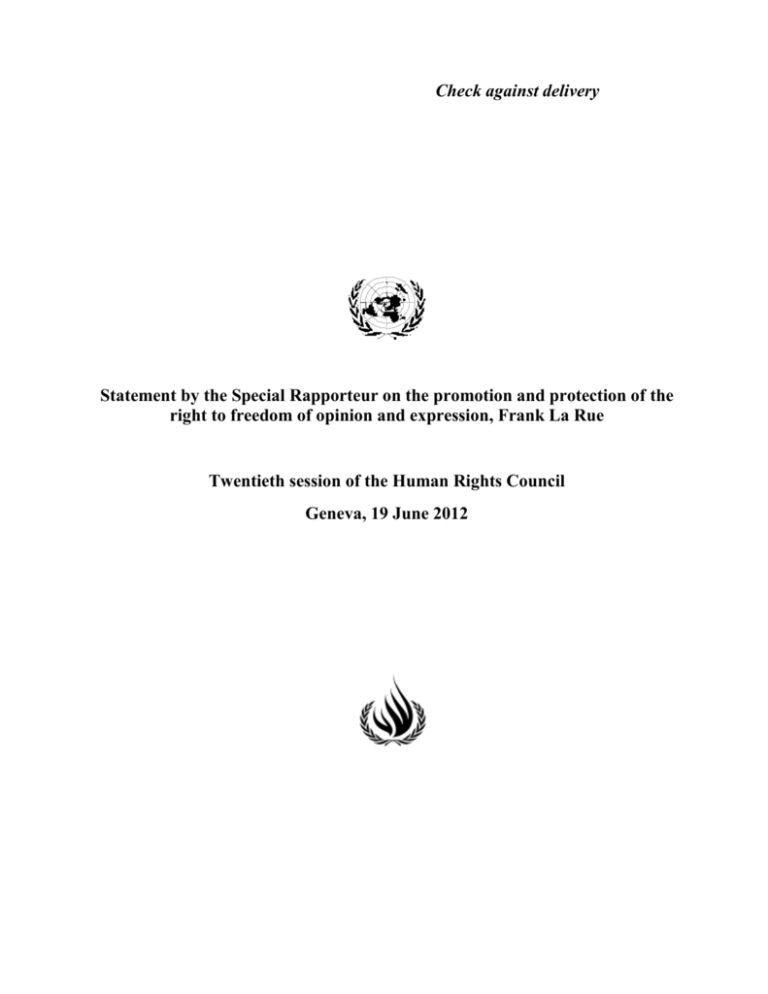
Check against delivery Statement by the Special Rapporteur on the promotion and protection of the right to freedom of opinion and expression, Frank La Rue Twentieth session of the Human Rights Council Geneva, 19 June 2012 Madame President, Excellencies, Ladies and Gentlemen, My annual report this year explores key trends and challenges to the protection of journalists and media freedom. It also provides an overview of the activities that I have undertaken last year, including issuance of press releases and communications, participation in conferences, and country visits requested and undertaken. I am also pleased to present the two addenda with my findings and recommendations from my visits to Algeria, Israel and the occupied Palestinian territory. For this year, I look forward to carrying out visits to Honduras and Indonesia, and would like to thank the respective Governments for extending me their invitations. Madame President, The issue of the protection of journalists has been a central component of my mandate, and one which I have addressed in the past through several reports to the Human Rights Council and the General Assembly. I have decided to dedicate my report to the Council on this issue once again, due to the continuing repression of journalists and media freedom worldwide, aimed at suppressing information deemed “inconvenient”, as well as increasing restrictions placed on journalists who disseminate information through the Internet. As outlined in my report, I have adopted a functional definition of journalists, in line with the views of the United Nations Human Rights Committee. An attack against a journalist is not only a violation of his or her right to impart information, but also a violation of the right of individuals and society at large to “seek and receive information and ideas of all kinds”. Without respect for the right to freedom of expression, and in particular media freedom, it is impossible to create an informed, active and engaged society, which is essential for transparency and democratic participation. An attack against a journalist can therefore be conceived as an attack against democracy. A worrying trend in 2011 was the increase in the number of attacks against journalists and individuals monitoring street protests and demonstrations around the world. Such attacks 2 ranged from arbitrary arrests and detention, verbal and physical attacks, confiscation or destruction of equipment, as well as killings. Additionally, while the death or plight of foreign journalists in armed conflict situations frequently draws the attention of the international community, it is the local journalists who face daily risks and violations of their rights in situations that have not reached the threshold of armed conflict, but may be characterized by violence, lawlessness and/or repression. These range from restrictions to movement, including deportations and denial of access into a country or a particular area; arbitrary arrests and detention, particularly during public crises or demonstrations; torture and other cruel, inhuman or degrading treatment or punishment, including sexual violence against female journalists; confiscation of equipment, information theft, illegal surveillance and office break-ins; intimidation, harassment, including of family members, death threats, stigmatization and smear campaigns; to abductions, enforced disappearances and assassinations. Perpetrators of attacks against journalists include both State and non-State actors, such as organized criminal groups, security forces, or paramilitary groups. Journalists who report on matters such as human rights violations, corruption, organized crime, drug trafficking, public crises, demonstrations, or environmental issues, including on mining and infrastructure projects, are at particular risk. Online journalists and bloggers also face additional forms of harassment, intimidation and censorship, such as illegal hacking into their accounts, monitoring of their online activities, arbitrary arrests and detention, and the blocking of websites that contain information that are critical of authorities. The killing of a Mexican reporter, Maria Elizabeth Marcias Castro, whose decapitated body was found with a note stating that she had been killed for reporting news on social media websites, underscores the dangers faced by journalists who disseminate their work through online platforms. Moreover, according to the Committee to Protect Journalists, almost half of the 179 journalists imprisoned in 2011 were those whose work appeared online. 3 Additionally, States continue to utilize criminal laws on defamation, national security or counter-terrorism to suppress dissent and criticism, including on Government policies, human rights violations, and allegations of corruption. Such “judicial harassment” generates a climate of fear and encourages self-censorship. I therefore reiterate my call upon all Governments to decriminalize defamation, and to repeal or modify vaguely and broadly worded legislation on national security or counter-terrorism. I would also like to stress that journalists should not be held responsible for receiving, storing and disseminating classified data which was obtained in a way that is not illegal, including leaks and information received from unidentified sources. Neither should they be forced to reveal their sources of information. Additionally, I call upon all States to facilitate access historical archives of official information to enable journalists, academics and human rights victims to establish the truth about past violations. Madame President, The problem of continued and increasing violence against journalists is not the lack of legal standards, but the lack of implementation of existing norms and standards. Indeed, it is the failure of States to take effective preventive measures, as well as their unwillingness or inability to investigate and prosecute those responsible that continues to fuel violence against journalists. To address the problem of impunity, we must look at its root causes – whether it is lack of political will to pursue investigations, inadequate legal framework and a weak judicial system, lack of expertise of law enforcement officials and judicial bodies, negligence, or corruption. As the causes of violence against journalists and impunity vary from context to context, any strategies or protection mechanisms designed to protect journalists must be tailored to the local needs with context-specific consideration of the differing needs of journalists through consultations and involvement of journalists themselves. In this regard, I would like to welcome the establishment of a protection programme for journalists and the National Unit for the Protection of Journalists in Colombia, which provides 4 journalists with concrete and material assistance, such as bulletproof vehicles and emergency transfers to safe areas. I am also encouraged by the steps taken in Mexico to combat ongoing violence against journalists, including the establishment of the Special Prosecutor’s Office for Crimes against Freedom of Expression, and a law adopted to criminalize violence against journalists. I would like to stress that the protection of journalists requires a holistic approach that includes material, legal, and political measures of protection, including public condemnation of attacks against journalists and support for press freedom by high-level State officials. For their part, journalists and media organizations should take precautionary safety measures to ensure their own protection. Additionally, by voluntarily adhering to global standards of professionalism, such as the Declaration of Principles on the Conduct of Journalists, journalists can also enhance their credibility in the eyes of society and their legitimate protection concerns. Mission to Algeria I undertook my mission to Algeria from 10 to 17 April 2011, during which I visited Algiers and Oran. I congratulate the Government of Algeria on having voluntarily invited me to visit the country, which I consider as good practice. Algeria has come a long way since the Black Decade, during which journalists paid a tremendously high price. I pay tribute to those who lost their lives during the conflict, and to their families. Today, such violence against journalists no longer exists in Algeria, but I have several issues of concern that I would like to raise. While I welcome the adoption of a law in August 2011 to decriminalize defamation against public officials, I am concerned that defamation remains a criminal offence under the Criminal Code. I am further concerned that an individual can be fined and jailed if he or she “exploits the wounds of the national tragedy, with a view to harming Algerian institutions, harming the honour of its agents who served with dignity or tarnishing the image of Algeria at the international level”. Although this provision in the ordinance on the implementation of the 5 Charter for Peace and National Reconciliation has never been invoked, it encourages selfcensorship by the media. A law on information, adopted in December 2011, contains some positive provisions, including the opening of the audiovisual sector to Algerian private companies. However, I have several concerns regarding the law, including the imposition of broad restrictions on the types of information that can be disseminated. I further note with concern acts of intimidation against journalists, lack of independence of the media, and weakening of the press. Most of the newspapers are very small and depend entirely on official advertisement for subsistence, and State-sponsored newspapers are reportedly used by the Government to dilute and “balance out” any criticism of its policies. I also find it regrettable that Al Jazeera is not permitted to operate in the country. In relation to freedoms of peaceful assembly and association, which are integral to the enjoyment of the right to freedom of opinion and expression, I am concerned that there are arbitrary restrictions imposed by the Government, including an opaque procedure of authorizing marches, broad criteria to refuse the establishment of new associations, and restrictions on access to foreign funding and on the work of foreign associations. Finally, I once again call on the National Advisory Commission for the promotion and protection of human rights to raise the legitimate human rights demands, past and present, made by all sectors of civil society. Mission to Israel and the occupied Palestinian territory My mission to Israel and the occupied Palestinian territory was carried out from 6 to 17 December 2011. In Israel, I visited West Jerusalem, Tel Aviv, Be’er Sheva and other surrounding villages in the Negev desert. In the occupied Palestinian territory, I visited East Jerusalem, Ramallah, Nabi-Saleh, and Gaza. I would like to express my appreciation to both authorities for facilitating my visit. 6 With regard to the situation in Israel, I am concerned by the recent attempts to limit criticism of Israel regarding its policies and practices of occupation, and questioning of Israel as a Jewish state. This includes, for example, adoption of laws that prohibit the commemoration of Israel’s independence day as the day of mourning; creation of additional reporting obligations that disproportionately affect Israeli human rights NGOs; and prohibition of boycotts or calls for boycotts of Israeli products and those produced in the settlements in the West Bank. I am also concerned by the proposed bill to amend the defamation law to increase the financial penalties for defamation by six fold. I would like to appeal to all members of the Knesset to ensure that new legislative proposals are strictly in conformity with Israeli’s international human rights obligations. The existence of a military censor in Israel is another area of concern, as prior censorship mechanisms should not exist in any country. I therefore encourage the Government of Israel to consider abolishing this post. I am also very concerned by the prosecution of Uri Blau, an investigative journalist who received classified military information from a former soldier. As mentioned earlier, journalists should never be held responsible for receiving such information, nor be forced to reveal their sources. In the occupied Palestinian territory (oPt), journalists face multiple obstacles to carry out their work as a result of the internal division between the Palestinian Authority in the West Bank and the de facto authorities in Gaza. Journalists affiliated with the other are often viewed with suspicion, and certain newspapers are banned in the West Bank and in Gaza as they are perceived to be sympathetic towards either the Hamas or Fatah respectively. I would like to appeal to the Palestinian Authority and the de facto authorities to support the work of Palestinian journalists in the spirit of unity and cooperation, including by lifting the symbolic ban on newspapers, especially given that the content is available on the Internet. In the West Bank, I am concerned by the recent increase in the number of journalists, human rights defenders and bloggers who are arbitrary detained and interrogated by the security forces of the Palestinian Authority for criticism of public officials. 7 The ability of individuals in the West Bank to express their opinions through demonstrations is also limited by the Israeli Defense Forces, who prevent demonstrations from taking place; use excessive force to disperse unarmed protesters; and intimidate villagers where demonstrations regularly take place through night raids and the use of sound or gas bombs aimed at their houses. I am also deeply concerned by the recent raids of media offices in the West Bank by the Israeli security forces and the confiscation of equipment without any prior warning or justification of such actions. In East Jerusalem, the right of Palestinians to freedom of opinion and expression is unduly restricted by the Government of Israel, through the banning of cultural events, forcible expulsion of Palestinian residents for alleged lack of loyalty to the State of Israel, and censorship of text books used in Palestinian schools. I appeal to the Government of Israel to fully guarantee the right to freedom of opinion and expression and the related right to freedom of assembly and association of all individuals under its control. In Gaza, I am concerned by the excessive use of force by the security forces of the de facto authorities to disperse peaceful assemblies; raids and closures of media and human rights organizations and conferences; and arbitrary arrests and detention of those expressing opinions deemed unacceptable by the de facto authorities. I am also concerned by the new requirement for foreign journalists to name a local contact in order to enter Gaza, which may deter reporting on sensitive matters to prevent any acts of reprisal against the named individual. Further issues of concern, as well as detailed recommendations to the Government of Israel, the Palestinian Authority, and the de facto authorities can be found in the addendum to my report. I look forward to providing further assistance as necessary and to continue my dialogue with all parties concerned. Madame President, It is undeniable that without free and independent media to inform the public, and the space given to all individuals to express their opinions freely, we cannot have a sustainable and democratic society based on accountability, transparency and respect for human rights. I renew 8 my call on all Governments to be tolerant of criticisms, ensure that journalists can carry out their functions effectively, and to allow individuals to seek, receive, and impart information and ideas of all kinds through any means. In this regard, I reiterate my willingness and readiness to provide my assistance to States to guarantee the full respect of the right to freedom of opinion and expression. Thank you very much for your attention. 9

